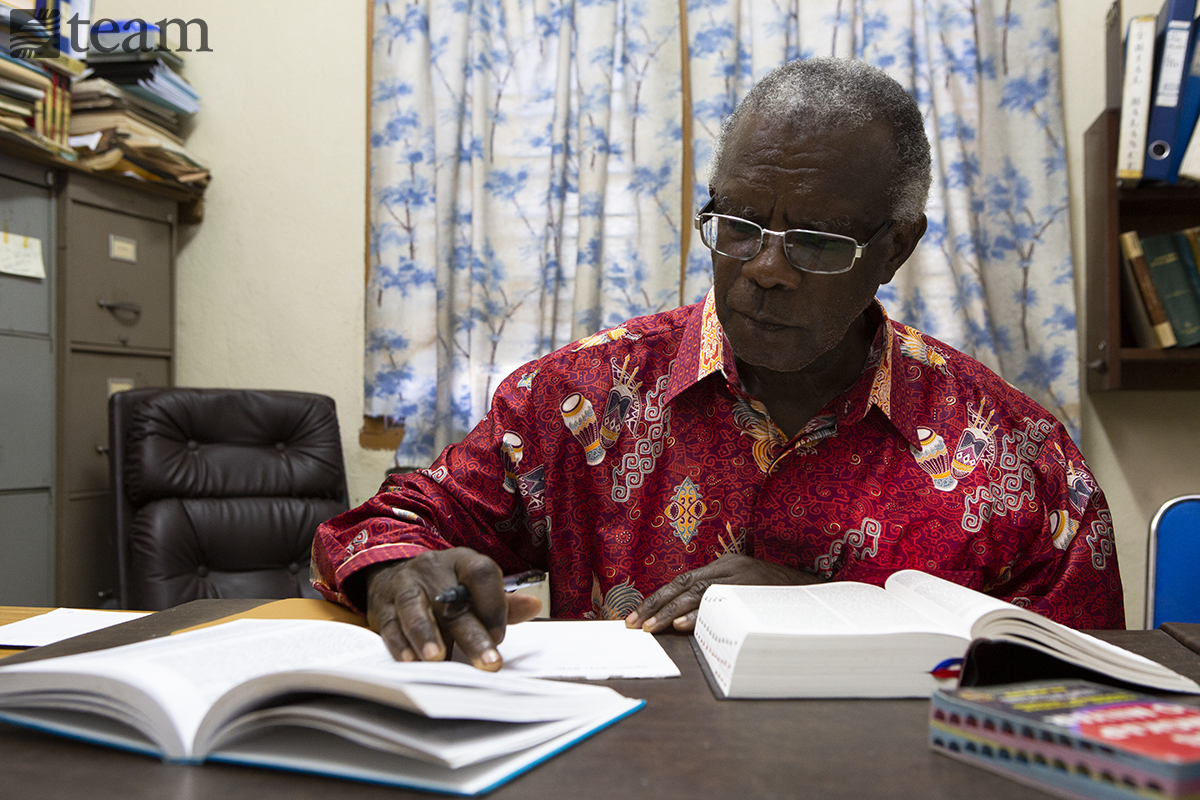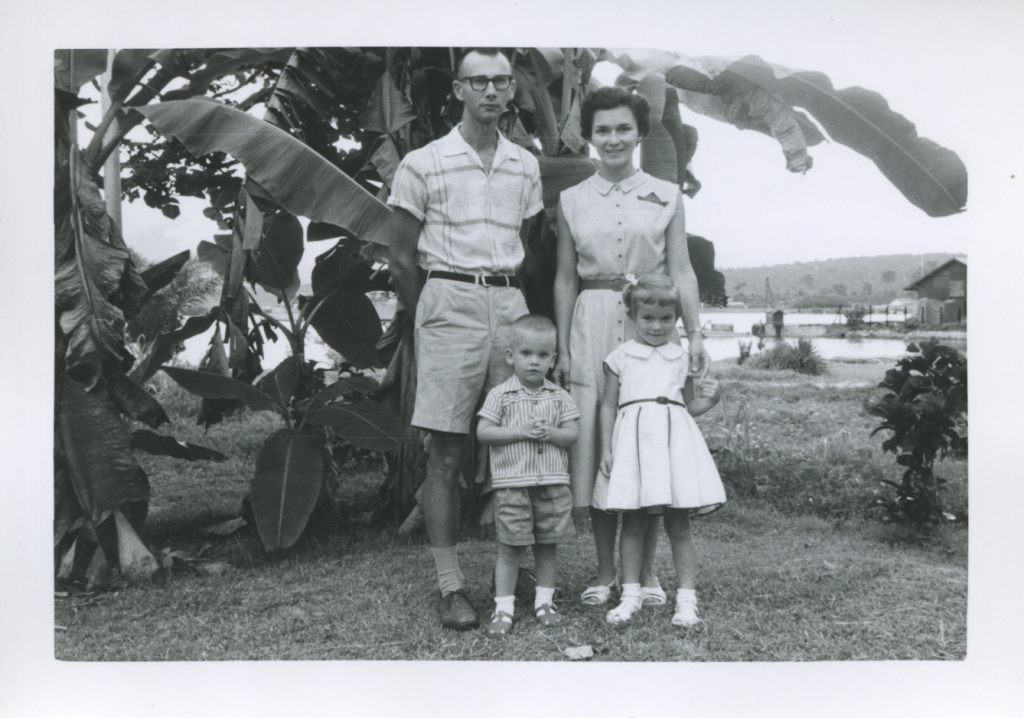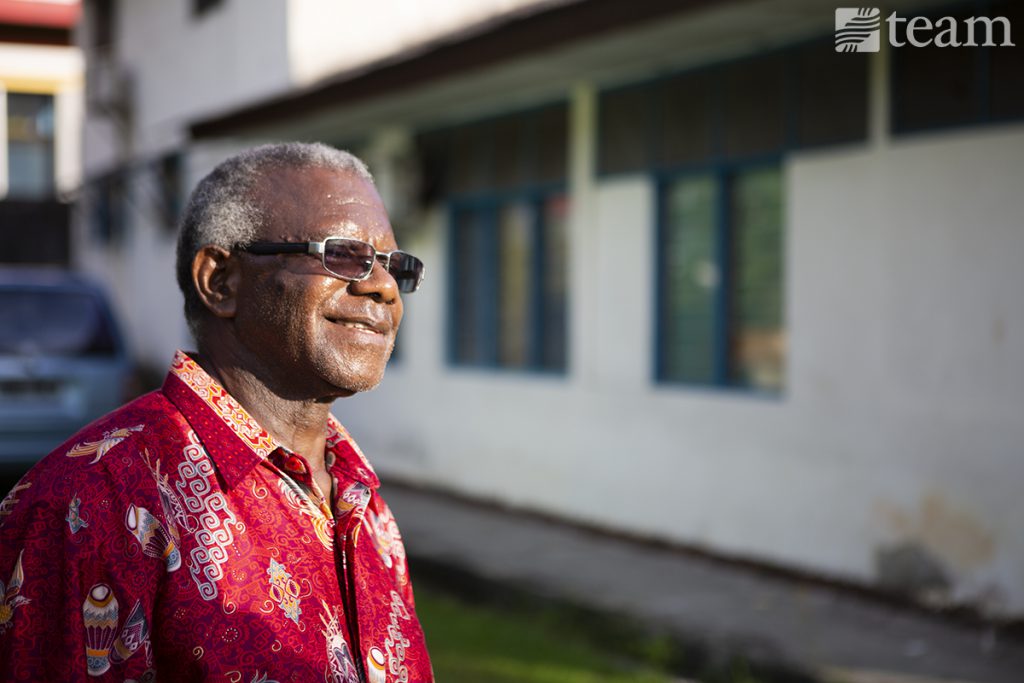
Ministry Updates
On an Island Without the Bible
January 13, 2020
by admin

Imagine this: You’re on an island, and you can only keep a few Bible verses. The rest will be wiped from your memory. Which verses do you choose?
Give it just a little thought, and the question quickly becomes complicated.
You could use up all the verses on explaining Gospel. But what about God’s character? What pleases God? How does He think of you? How should you relate to others in light of Christ?
Even if you had years to choose, you would agonize over what you were missing.
But you might understand a little of what Simson Dowansiba felt.
Simson longed to follow God, but only a few Bible verses had ever been translated into his language. And following God was a new concept to everyone else in his tribe, too.
Just a few years before, they didn’t know there was a God to follow.
Missionaries Broke the Tribe’s Isolation
Simson grew up in the mountains of Irian Jaya, now Papua, Indonesia. Other nations vied for control of the island, but with no roads inland, local tribes maintained their control of the mountains.
It was a blessing and a curse.
Simson’s tribe, the Hatam, preserved their culture. And yet, they had many problems — and no differing perspectives to help them solve them.
The tribes were constantly at war. Husbands treated their wives as slaves. No one trusted anyone. And instead of God, they worshiped spirits in trees, mountains, rivers and animals.
But when Simson was a small boy, two TEAM missionary couples dared to enter Simson’s mountain community. They said there was an afterlife and a God of love. The message amazed the Hatam.
Simson’s parents were among the first people to believe. Many more followed, including Simson.
Verses on Index Cards Weren’t Enough
The missionaries started church services and Bible classes, but the Hatam people were hungry for more. Now that they had found God, they wanted to know Him intimately.
As he learned the language, TEAM missionary Dick Griffiths started translating Bible verses into Hatam and handing them out on index cards.

TEAM missionaries Dick and Char Griffiths worked in tandem to bring Scripture to the Hatam. Dick led a Bible translation team, and Char taught people how to read the new translation.
The Hatam people devoured these small snippets of God’s word.
“When they had memorized [the verses], they would teach other people,” Simson says. “Whether in their homes, in front of their houses, in the streets, in their gardens, they would teach each other about these Hatam verses which they had memorized.”
It was a good start, but Simson and his tribe wanted more. They soaked up the missionaries’ Bible lessons, trying to learn as much as they could about the parts of Scripture that hadn’t been translated.
The missionaries started sending tribesmen away to Bible school so the people could have more teachers. Simson was one of them.
After graduation, Dick Griffiths invited Simson to work on the project of his life: a Hatam Bible translation.
Bible Translation Transformed the Tribe
Dick had been learning the Hatam language, but he needed native speakers to ensure his accuracy.
“I didn’t understand the process, I didn’t know exactly how to assist with the correction,” Simson says. But the other members of the committee explained how to read the passages and choose the best words.
After Dick translated a passage, he would distribute copies to the committee members, and they would read over it for the next three or four days. Then the committee would suggest word changes or restructure sentences.
When the team encountered complex verses, they met with linguistic consultants who knew Hebrew, Greek and English.
As new sections of the Bible were released, Dick’s wife, Charlotte, began teaching literacy classes so people could read Scripture for themselves.
Simson saw a clear change in his community, especially among the women. They began teaching Bible classes, leading their children in devotionals and teaching Sunday school classes.
“That opened up a whole new world of women being able to serve … in their families, in their churches and so on,” Simson says.
But translating the Bible can easily take a missionary’s entire career — or longer. By the time Dick Griffiths was ready to retire, the team had translated the New Testament. But they still had 25 percent of the Old Testament left.
Dick needed a local man to continue in his place. He chose Simson.
Simson knew he wasn’t the most qualified. The other men just had too many responsibilities to take on the immense role. “But I believed that God had chosen me to carry on this role, so He will give me the wisdom and the strength to carry on this ministry,” Simson says.
Most qualified or not, Simson knew he had to finish the job.
‘Because I Could Read it for Myself’
During those final years of translation, Simson felt God’s leading in a special way.
“I feel that the Holy Spirit would actually give me words that were suited for that translation in Hatam,” Simson says.

Simson has watched the Hatam-language Bible transform his tribe. A desire to read the Bible has led to an emphasis on education, and the truth of God’s word has transformed relationships.
In 2008, Simson and the translation committee finished the Hatam Bible translation a TEAM missionary had begun. The first time he held a printed copy in his hands, he was overwhelmed with emotion.
“The difference between memorizing a verse with holding the Bible in one’s own hand is a very big difference,” Simson says. “Because I could read it for myself and contemplate and understand it, then carry it out and teach other people as well.”
Through God’s word, the Hatam have changed from a violent, fearful people to a community of peace, love and generosity.
Since Indonesia took ownership of Papua, the Hatam Bible has played an integral role in preserving Hatam culture. And the desire to read the Bible has led to an emphasis on education that has opened doors for Hatam people to serve in government offices.
But for Simson Dowansiba, the importance of the Hatam Bible translation goes far beyond the Hatam tribe.
Papua is home to 249 languages. Only two of them have full Bible translations.
“When I preach,” Simson says, “I always tell my people that we have a greater responsibility to read God’s word and serve God — because we have been given a complete Bible in our language.”
As the Hatam study God’s word, they are sending missionaries of their own to unreached tribes. One day, they pray that every tribe and tongue will know His word for themselves.
Related articles


